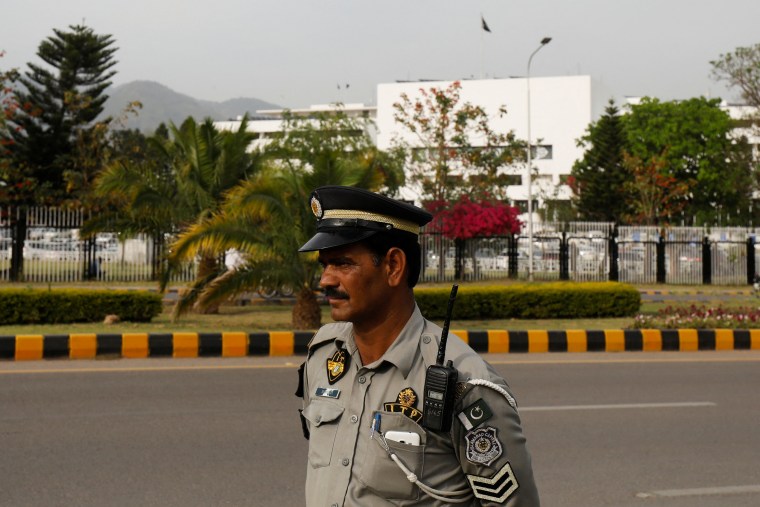On April 11, 2022, Pakistan’s parliament elected Shehbaz Sharif, leader of the Pakistan Muslim League-Nawaz (PML-N) and younger brother of former three-time Prime Minister Nawaz Sharif, as the country’s new prime minister after ousting Imran Khan of the Pakistan Tehreek-e-Insaf (PTI) party in a no-confidence vote, according to news reports.
Since that political transition, journalists have faced physical assault and online and legal harassment, according to multiple news reports and the journalists, who spoke to CPJ by phone. The new PML-N government has also announced several bureaucratic and legislative reforms that will impact press freedom and freedom of expression.
On April 21, a group of around 20 PTI employees assaulted Khawar Mughal, a reporter for the privately owned broadcaster 92 News, at a party gathering at the Minar-i-Pakistan monument in Lahore, the capital of the northeast Punjab province, according to Dawn and Mughal, who spoke to CPJ by phone.
When Mughal arrived at the venue, with the 92 News logo on his microphone, the employees beat, kicked, and pushed the journalist, snatched his microphone, and accused the TV channel of airing anti-PTI programs, saying they would not allow the outlet to cover their gathering, according to those sources.
When other journalists stepped forward to help Mughal, the employees threatened them with the same treatment until they backed away, according to those sources. Mughal told CPJ that he sustained minor injuries across his body but did not require medical attention.
Police have registered a first information report, which opens an investigation, against the unnamed perpetrators, according to a copy of the report that CPJ reviewed. Lahore police spokesperson Mazhar Hussain did not respond to CPJ’s request for comment sent via messaging app.
At a PTI party gathering in Lahore on April 22, an unidentified person held up a banner with a veiled rape threat against Gharida Farooqi, a host for the talk show “G for Gharida” on the privately owned broadcaster News One, according to a tweet by Freedom Network, a local press freedom group, and Farooqi, who spoke with CPJ by phone. Farooqi told CPJ that she filed a complaint with the Federal Investigation Agency, adding that photos of the banner were shared widely across social media.
Since 2014, Farooqi has filed around eight complaints with the Federal Investigation Agency in response to gendered online harassment, including death and rape threats, she said, adding that the Federal Investigation Agency has not brought any of the perpetrators to justice. CPJ has previously documented gendered online harassment against Farooqi. Tahir Rai, the newly appointed director-general of the Federal Investigation Agency, did not respond to CPJ’s emailed request for comment.
Also on April 22, the Pakistan Electronic Media Regulatory Authority (PEMRA), the country’s broadcast regulator, issued a formal notice to the privately owned ARY News channel after it covered comments by Asad Majeed, the former Pakistani ambassador to the United States, about an alleged foreign conspiracy to topple former Prime Minister Khan, according toDawn and a copy of the notice.
The notice requested the broadcaster to demonstrate why legal or disciplinary action should not be taken against it. It also ordered ARY News CEO Salman Iqbal to appear for a hearing on April 29 and submit a written response to PEMRA, according to Dawn. PEMRA’s media office did not respond to CPJ’s emailed request for comment. CPJ emailed ARY News for comment but did not receive a reply.
Separately, on April 19, newly appointed Minister for Information and Broadcasting Marriyum Aurangzeb announced it would scrap the proposed Pakistan Media Development Authority, a regulatory body proposed under the previous government that would have put the country’s entire media under a single government-led authority, according to Dawn. CPJ had previously called on former Prime Minister Imran Khan to halt plans to establish the body.
Aurangzeb also announced that the new government would review the 2016 Prevention of Electronic Crimes Act (PECA), particularly the sections in which the right to freedom of expression was “misconstrued,” according to Dawn. CPJ has repeatedly documented how the law has been used to detain, investigate, and harass journalists in retaliation for their work.
Aurangzeb also decried the PECA ordinance, which was introduced under the previous government in February 2022, calling it a “black law,” according to Dawn. CPJ had previously called on authorities to revoke the proposed ordinance, which would have expanded prison terms for online defamation on social media platforms to five years. The Islamabad High Court struck the law down earlier this year.
Aurangzeb further announced that the 2021 Protection of Journalists and Media Professionals Act, passed under the previous government, would be implemented soon, according to Dawn. However, the act in its current form, which CPJ reviewed, includes a section that prohibits journalists from disseminating “false or untrue” materials, which may be used to further crack down on press freedom.
On April 23, Aurangzeb said that the new government would revise the PEMRA laws to stop “fake news,” according to The Express Tribune. Aurangzeb did not respond to CPJ’s request for comment sent via messaging app.
[Editor’s note: In a letter sent to CPJ via a spokesperson after publication, Ambreen Jan, Director General of Pakistan’s Ministry of Information and Broadcasting, said, “The Government of Pakistan is committed to support, protect and promote free, independent and responsible media and it will continue taking all possible steps, in consultation with stakeholders, to promote healthy journalism and positive journalistic values.”]
